Nov 20, 2024 – Religious Leaders’ Meeting, Weekly Dharma Assembly
Today is the day for the Religious Leaders’ Meeting for National Reconciliation and Peace.

Sunim departed from Dubuk Retreat Center at 3 AM and headed to Seoul. He took a short nap in the car.
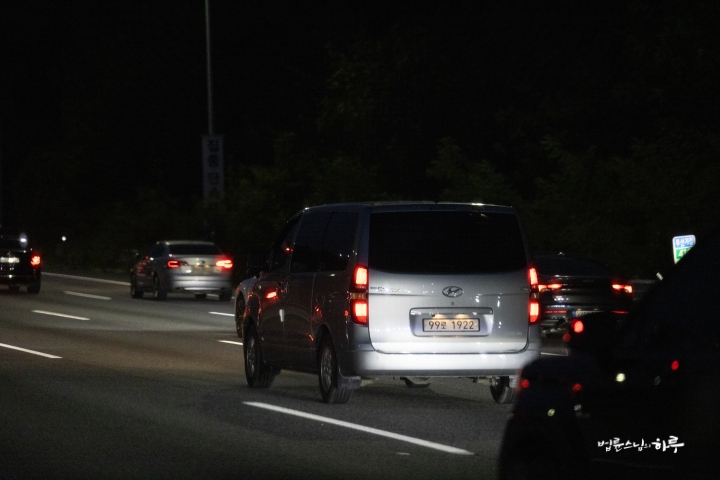
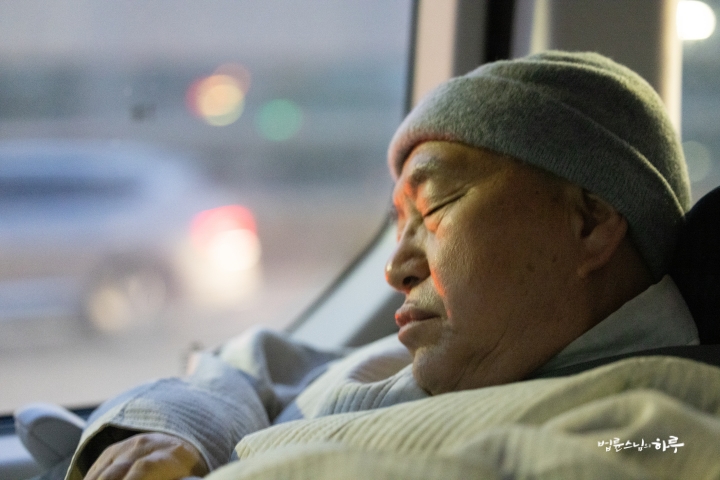
After a 4-hour and 30-minute drive, he arrived at the Jungto Social and Cultural Center in Seoul at 7:30 AM.
Pastors, priests, ministers, bishops, and religious leaders all arrived at the Jungto Social and Cultural Center and began the meeting over breakfast. After the meal, they moved to the Peace Foundation conference room to engage in more in-depth discussions.
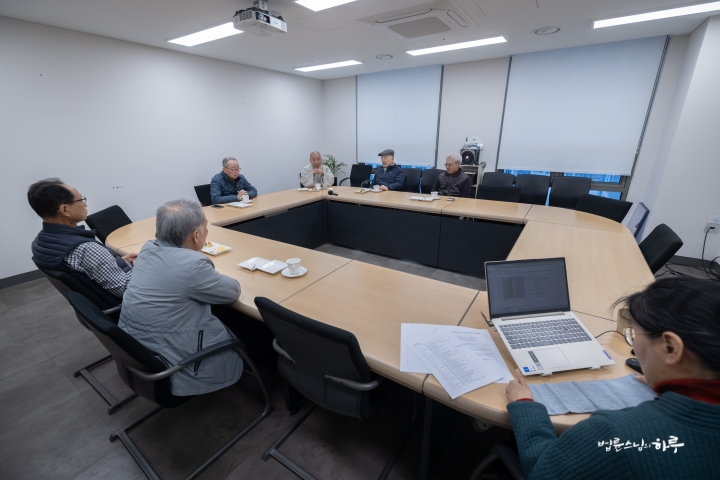
First, Sunim spoke about the upcoming pilgrimage to commemorate the 200th anniversary of the birth of Great Master Choe Je-u.
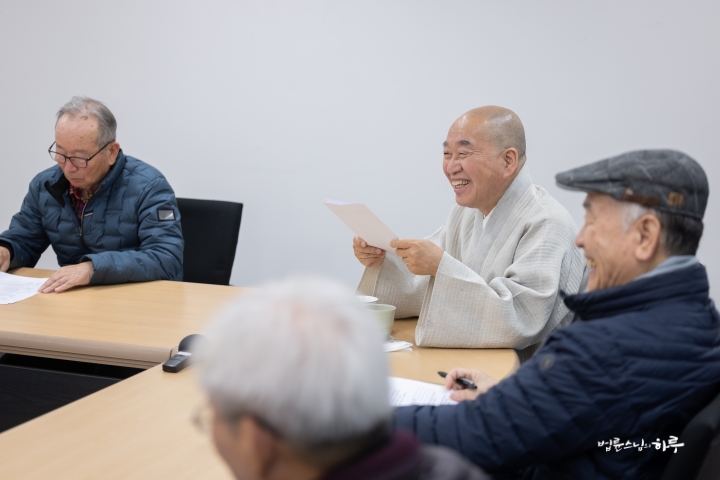
“Thank you for attending the Peace Foundation’s 20th anniversary event last week. Next week, we have the pilgrimage to commemorate the 200th anniversary of Great Master Choe Je-u’s birth. Great Master Choe Je-u had a significant influence on Korea’s modern history. Despite this, the 100th anniversary celebration couldn’t be held due to Japanese colonial rule. Now that South Korea has developed significantly, it’s not appropriate for the country to neglect the 200th anniversary celebration of the Great Master’s birth. In fact, the government should be organizing a grand celebration. However, since the government isn’t doing so, our religious leaders’ group has ended up preparing for it. This pilgrimage might be our largest event since our visit to Kaesong in 2010 to provide 300 tons of flour for humanitarian aid to North Korea.”
He then introduced the detailed program for the 3-day, 2-night pilgrimage and reviewed it to see if there is any practical aspects that needed to be revised.
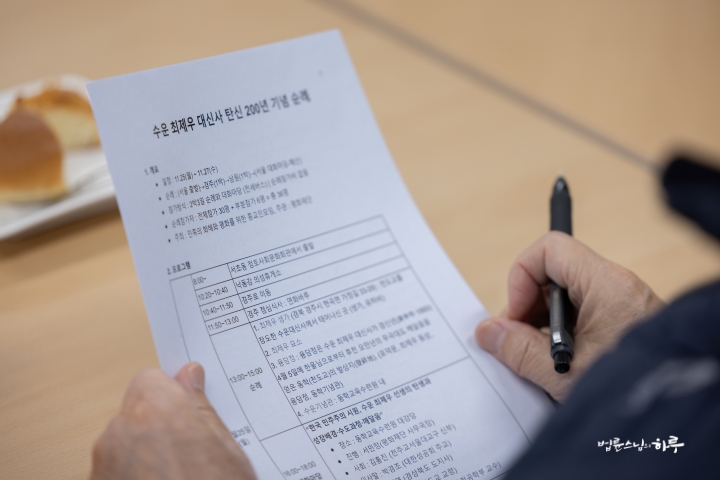
Former Cheondogyo Leader Park Nam-soo spoke about the significance of this event.
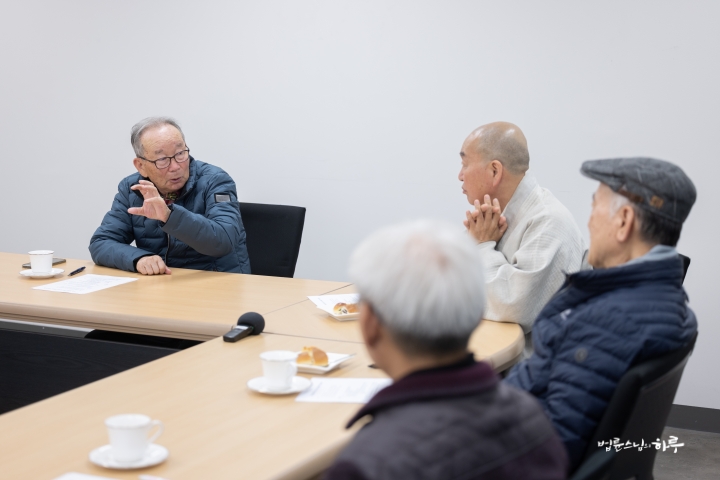
“Although we have different religions, I believe this program, where we follow the footsteps of someone who greatly influenced Korea’s modern history together, is a form of peace movement. There couldn’t be a more meaningful peace movement than this. Interfaith dialogue is an important aspect of the various projects the Peace Foundation is undertaking. It’s a lifetime honor for me to guide Sunim, priests, pastors, and bishops to the birthplace of Great Master Choe Je-u.”
After reviewing the program, they discussed current national issues. Sunim mentioned the war crisis on the Korean Peninsula and Trump’s re-election, and also expressed concern about the medical crisis.
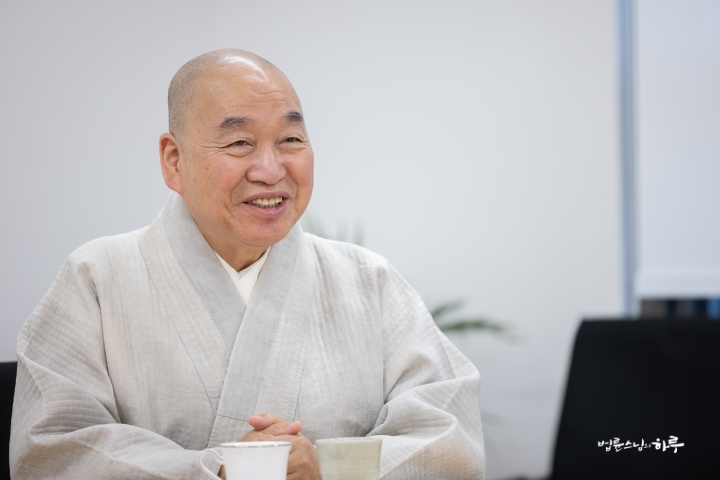
“In fact, the risk of war on the Korean Peninsula is higher than ever, and we should actively appeal to the public for peace. However, with the current poor state of the common people’s economy, I was concerned that if social elders came out and said ‘war could break out,’ it might be misunderstood as causing social unrest. But when I recently met with the opposition party leader, he said that people are actually more anxious about the possibility of war. In this situation, with Trump’s re-election success, while the economy is likely to become more difficult, the tension on the Korean Peninsula has actually decreased somewhat. So I think it might be better to observe a bit more until next spring and then actively express our voices.
Above all, I think there will be a severe medical crisis next spring, and the damage will be quite serious. All existing medical students will have to repeat a year, and with the increase of 2,000 in medical school admissions, 5,500 new students will enter next year, resulting in a situation where many medical students need to be educated in one year. It’s uncertain how so many medical students can be educated under current conditions. In this situation, new doctors need to be produced, but that also seems difficult.”
The religious leaders also expressed their deep concerns about the country’s abnormal operation.
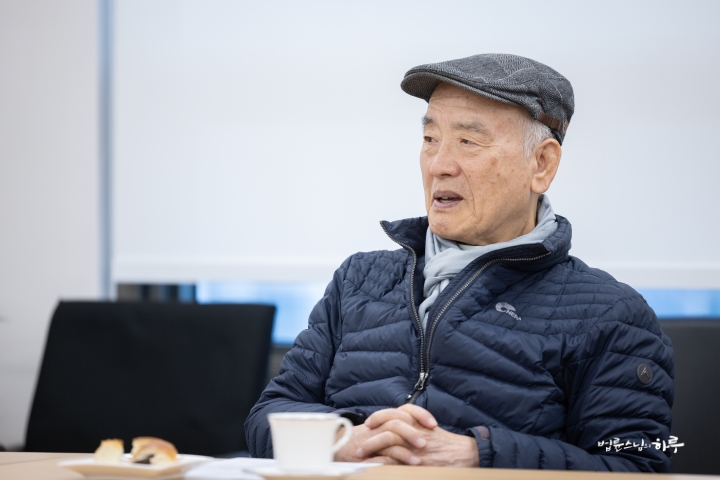
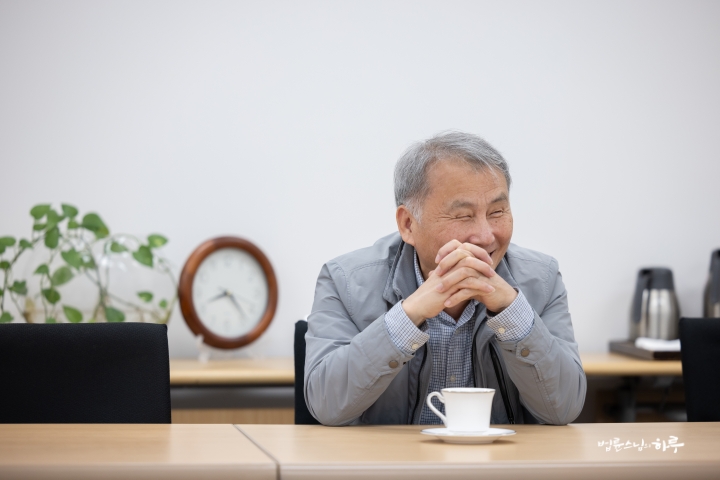
“The people’s hearts are suppressed, and I think this suppressed feeling might burst out next spring. The April 19 Revolution and the May 18 Democratization Movement all happened in spring. I think next spring will be a critical juncture this time as well.”
Despite many concerns, they decided to observe the situation a bit longer rather than taking immediate action, and concluded the meeting.
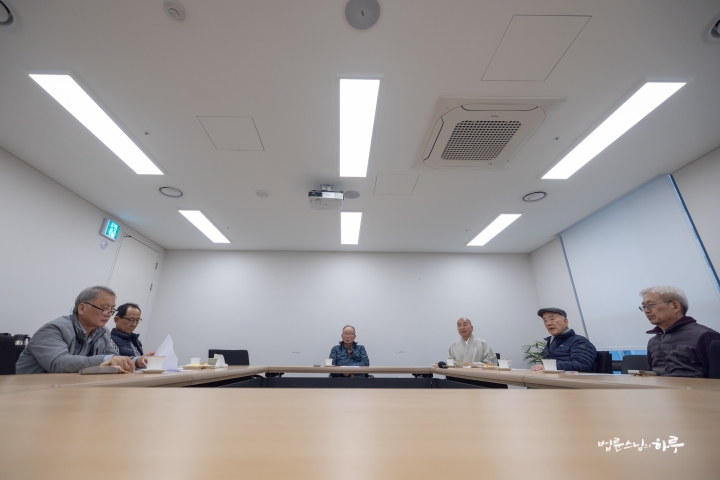
After seeing off the religious leaders, Sunim moved to the broadcasting studio at the Seoul Jungto Center to conduct the live Weekly Dharma Assembly.
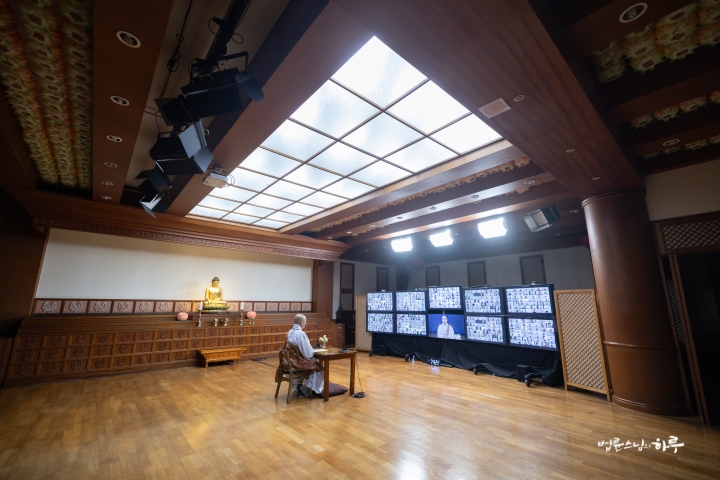
At 10 AM, with all Jungto Society members logged into the video conference room, the live Weekly Dharma Assembly began. First, they watched a video showcasing the activities of Jungto Society members over the past week. Then, Sunim gave his opening remarks.
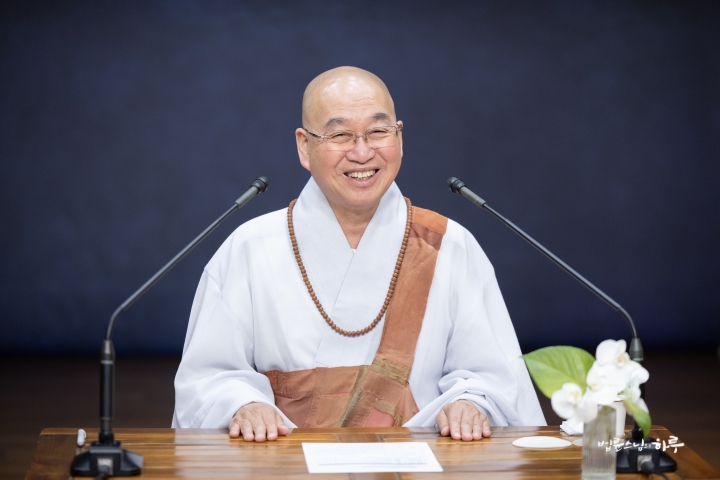
“The weather has suddenly turned much colder, hasn’t it? The heat wave persisted so long that we wondered if autumn would ever come, and then it suddenly turned cold. The weather changes seem to be getting more extreme year by year. Usually, the leaves start to change color in late October, but in the southern regions, they’re just starting to change now. In sunny spots, there are still green leaves that haven’t changed color. As the weather has become quite chilly, please be careful not to catch a cold.”
Then, Jungto Society members asked Sunim questions about various life concerns. Four people pressed the raise hand button and had a conversation with Sunim, and on-the-spot questions were also taken. One person sought Sunim’s advice, wondering if she should quit volunteering and go earn money as her husband was facing financial difficulties.
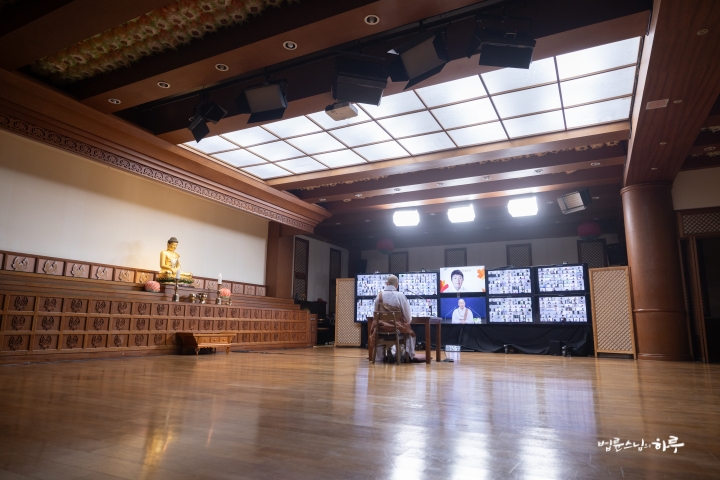
My Husband Is Struggling Financially, Should I Earn Money to Make a Living?
“First, if your husband’s business has failed and his income has stopped, and if you have no savings and need to rely on help from siblings or relatives to survive, then you should go out and work. Volunteering is good, but you need to earn at least the minimum amount for self-sufficiency. You don’t need to be picky about the job. Except for jobs that are ethically or morally criticized, you can do anything to earn money.
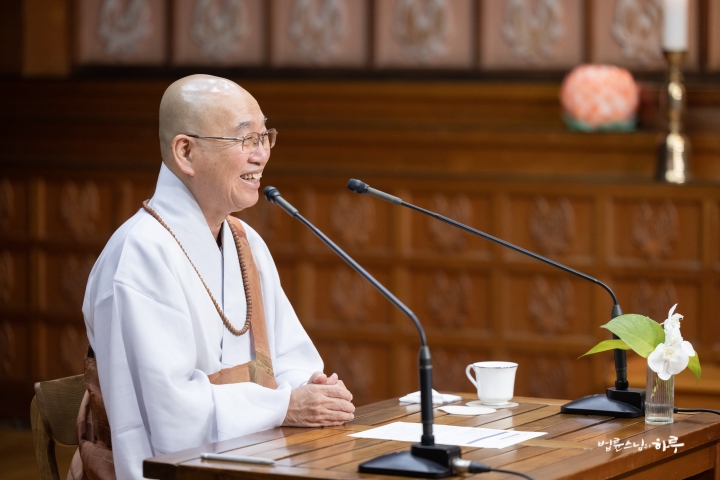
Second, if you have nothing to do and are spending your days idly at home with too much free time, it’s better to go out and work than to do nothing. Even if you’re not really in financial difficulty, it’s better to go out and work than to just idle away your time.
Third, you mentioned that you’re volunteering full-time. Although you’re not receiving a salary, you’re spending your days working as if it were a job. So, it’s a question of how much weight you place on the value of volunteering. Do you think the satisfaction of volunteering is more precious than buying a new outfit or eating delicious food? If you think that you can keep wearing the clothes you have, eat with kimchi, and that the meaning volunteering brings to your life is greater, then you should continue with your current volunteer work. And you can explain it to your son and husband like this:
‘Honey, the volunteering I’m doing now doesn’t bring in money, but it’s very meaningful to my life. I’m not doing this because I’m crazy, but because I feel a great sense of fulfillment. If we don’t have money, I’ll reduce my expenses. I’ll stop buying clothes or wearing makeup, and I’ll live frugally, so please let me continue my volunteer work.’
You need to make your perspective clear and ask for your husband’s understanding. We have to come to an agreement with family members we live with. Your son, who is over 20 and has been discharged from the military, should naturally go out and work. He served the country in the military, and now that he’s discharged, he should work in society. It doesn’t make sense for him not to work just because he’s your son. In that respect, I think your son should go out and work first.
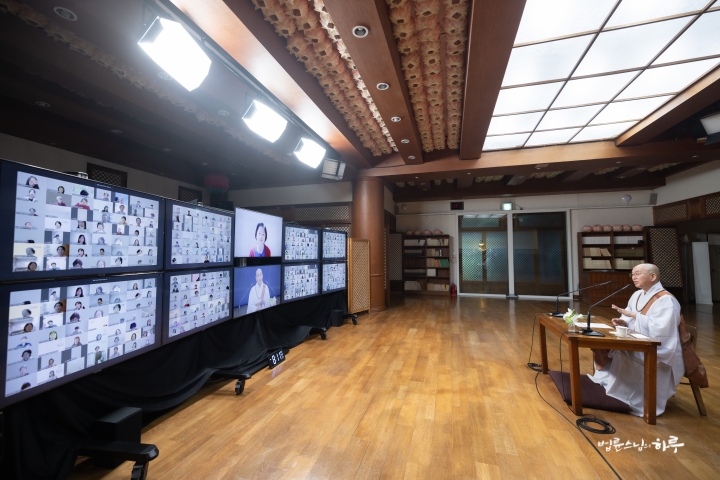
If you absolutely need to work because your husband can’t earn enough money and you’re feeling frustrated, then you should go out and earn money yourself. If your stance is, “I like Jungto Society and volunteering, but I must eat properly and wear decent clothes for each season. I can’t compromise on this,” then there’s no choice. Until now, your husband provided that money, but now that he can’t, you need to go out and earn it yourself. You might need to switch from full-time volunteering to part-time, quit your responsibilities, or resign as a leading member. I think you need to choose what you consider most important. This is my clear perspective on the matter.
“If I can’t afford to eat, I’m fine with not eating, and I’ll wear old clothes. Instead, I’ll use that time to do something helpful for the world.”
Similarly, if your situation is so difficult that you can’t even put food on the table, then becoming self-sufficient should be your priority. If that’s not the case, and you truly value your volunteer responsibilities, then you shouldn’t be easily swayed by these issues. First, if your mind is shaken by your husband’s nagging, it’s because you have a value system centered on money. Second, if the wife earns money, the husband’s sense of responsibility tends to diminish. If your husband’s sense of responsibility as the breadwinner is so great that it’s making him ill, you should encourage him by saying, “Honey, don’t feel too burdened. Even if I have to go out and earn money, we can manage, so please don’t worry too much.” However, the economy is generally not good right now, and retirement is approaching. At times like these, you can encourage him by saying, “Honey, the kids are all grown up now, so don’t worry too much. Can’t we manage by reducing our expenses a bit?” and continue with your volunteer work as before.
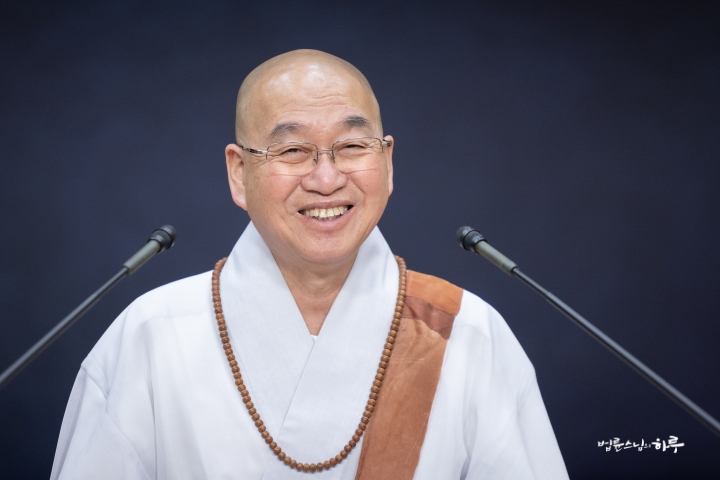
“However, as I mentioned earlier, if you are truly in economic hardship, or if you value consumption more than volunteering and feel you absolutely must do this, then you can choose to go out and work.”
“I understand. Thank you.”
The questions continued. After an hour and a half of Dharma Q&A, the live broadcast ended just after 11:30 AM.
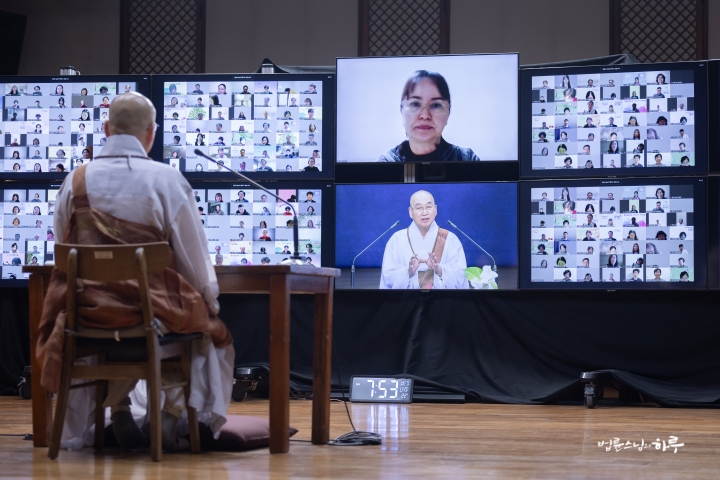
After lunch, Sunim spent the afternoon working indoors and reviewing next year’s schedule. He returned to The Peace Foundation and from 4 PM, he had a meeting with the foundation’s planning committee members.
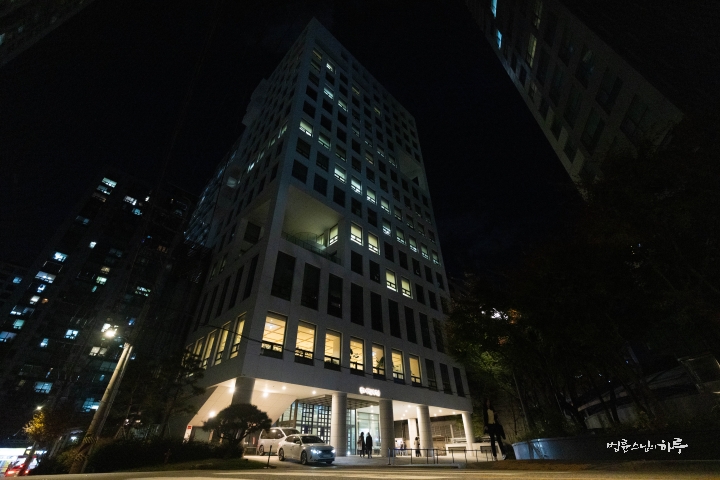
After discussing domestic and international affairs and the role of The Peace Foundation for two hours, the meeting concluded just after 6 PM.
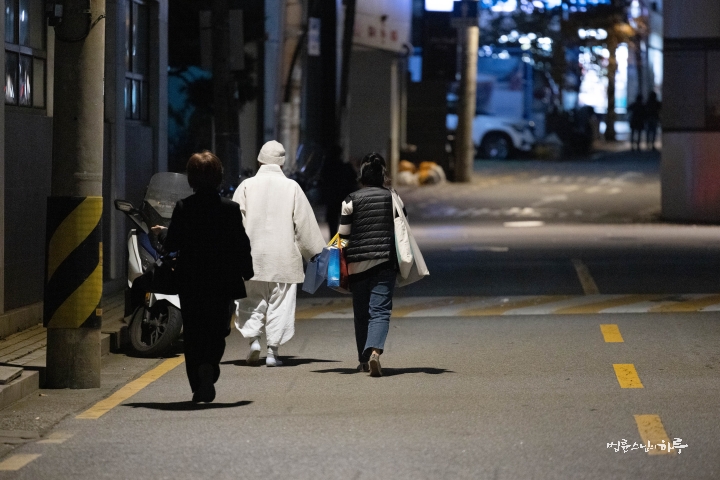
As the sun set, from 7:30 PM, Sunim conducted a live broadcast of the Weekly Dharma Assembly for evening members from the broadcasting studio at the Seoul Jungto Center. Once all Jungto Society members had entered the video conference room, Sunim greeted them. In the evening session, four people had pre-registered their questions and engaged in dialogue with Sunim, after which he took impromptu questions from the audience. One person shared concerns about how to deal with a daughter diagnosed with bipolar disorder.
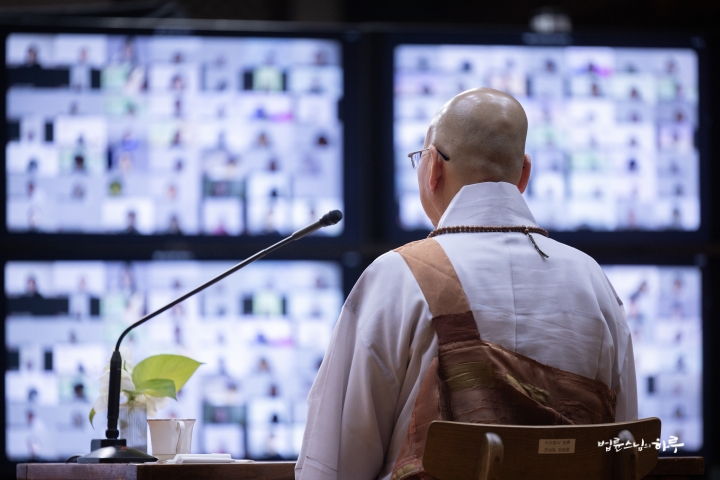
How Should I Deal with My Daughter Diagnosed with Bipolar Disorder?
“First, you need to have the perspective that your daughter is currently a bipolar disorder patient. If you make demands like ‘I wish you would do this’ or ‘I wish you would do that’ to your daughter who is a patient, she won’t comply. These days, even mentally healthy children don’t listen well to their parents. If you approach this from the perspective that you’re making good suggestions but your daughter isn’t listening, there won’t be a solution. Your daughter is a patient with an abnormal thought process who can act like an angel when she feels a surge of good mood, but when her mood suddenly drops, she may find people unbearable to look at.
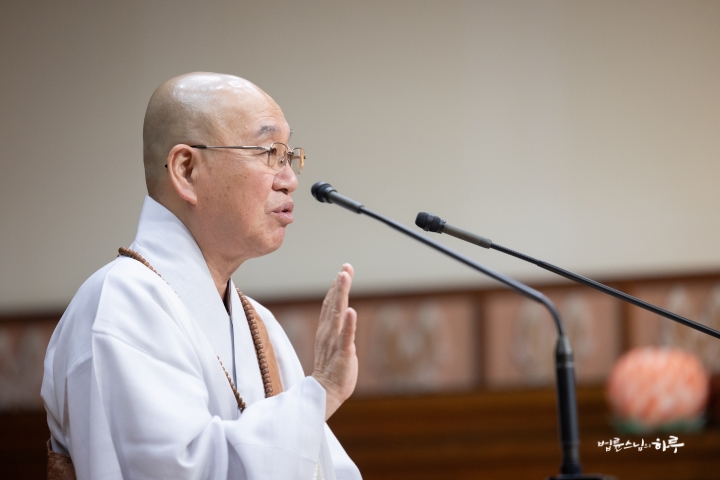
Second, you should ask the doctor about the symptoms of this illness and listen carefully. You need to know in advance what symptoms are shown during manic episodes and what symptoms are shown during depressive episodes. Even if your daughter seems very happy, it’s one of the patient’s symptoms, and even if she’s confined to her room and won’t come out, it’s one of the patient’s symptoms. You shouldn’t view your daughter’s behavior as her condition improving or worsening. This is because showing tendencies towards both good and bad moods is a symptom of bipolar disorder. It’s not that she’s returning to normal and then getting worse, but rather that she’s swinging between extremes of good and bad moods, which is why the term ‘bipolar’ is used. You need to observe these symptoms of your daughter well. Ask the doctor how to respond as a person close to her when these symptoms of the illness appear. For example, you might be advised to calmly observe without getting caught up in her mood when she’s overly excited, or not to worry too much and wait a little even if she locks herself in her room, doesn’t respond to contact, or disappears. You can help by following such expert guidelines.
However, the problem is that we unconsciously treat people with illnesses as if they were normal. Conflicts arise because we keep approaching the patient wanting things to go the way we want. Just as we let the body rest when it’s physically ill, allowing it to lie down if it wants to lie down, or sit if it wants to sit, we should respond to mental symptoms in the same way. However, when certain symptoms worsen, hospitalization may be necessary. This can happen if the patient wants it, but if they’re not exhibiting extremely unusual behavior, they can’t be hospitalized against their will. In other words, forced hospitalization is possible only when there’s evidence of extreme behavior that’s considered strange, such as hitting others, breaking objects, bowing in the street, or defecating in public. If your daughter’s condition worsens to the point where forced hospitalization is possible, you can have her hospitalized forcibly, either by taking her to the hospital yourself or calling emergency services. Before that point, forced hospitalization is not allowed. If you forcibly hospitalize your daughter simply because you’re dissatisfied with her behavior, you could be punished for human rights violations and cause emotional trauma to your child. It’s fortunate if she agrees when you suggest hospitalization, but refusing hospitalization is also a symptom, so don’t get upset if she doesn’t listen when you suggest it – that will only cause you distress. When the illness becomes very severe, you can hospitalize her against her will. This is the only way to respond.
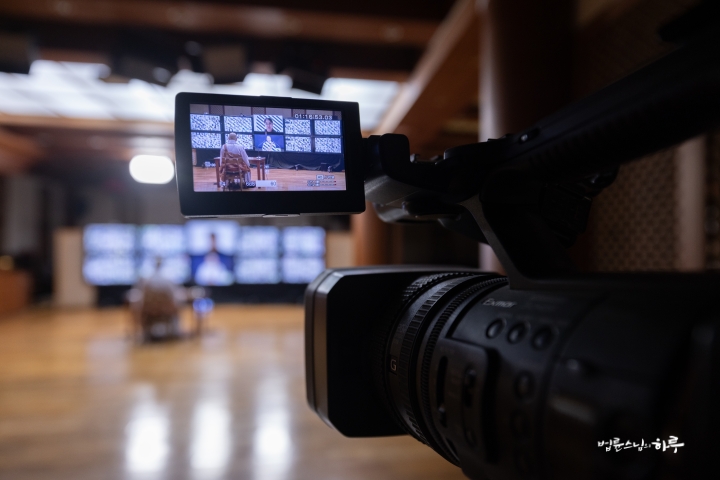
As the doctor said, there is no complete cure. The goal is to maintain the current condition or extend the intervals between hospitalizations. You shouldn’t think about stopping medication. It’s crucial to prevent extreme choices like suicide or violence against others. Sometimes, news reports about bipolar patients committing random acts of violence, and it’s extremely important for caregivers to prevent such extreme behaviors. Taking medication is essential to avoid these extreme actions. However, if the patient refuses to take medication, throws it away, or rejects it, there’s not much you can do. Being upset about them not taking medication doesn’t solve the problem. Your daughter is not in a normal state, so no matter how much you try to persuade her to take medication, it may not work as you wish. It’s necessary to observe your daughter’s symptoms and develop a perspective on how to respond to different symptoms – responding one way to certain symptoms and another way to others.
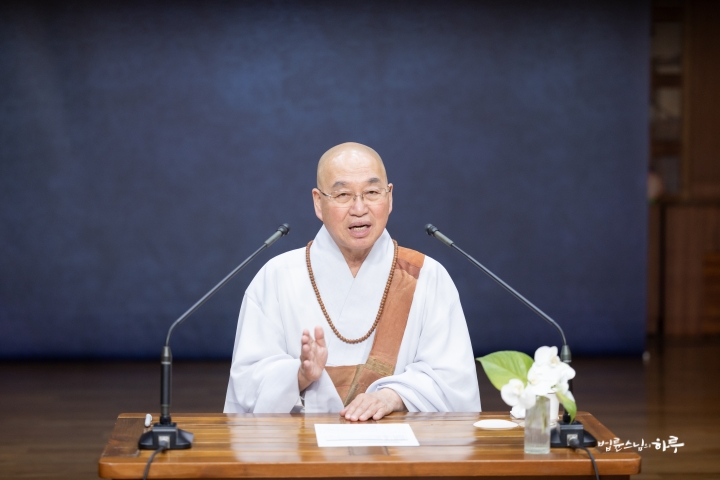
Parents of such patients can also live a happy life. However, when parents try to control their child according to their own wishes, they end up being dragged along. If you view the child as a patient and see any behavior as simply ‘Oh, that’s a symptom appearing!’, you can maintain your independence from your daughter. If you try to control your daughter, you unknowingly get pulled in and become one with her. This leads to situations where you both end up crying and causing a commotion. It’s better to maintain some distance from your daughter, observe her, and respond according to her symptoms. The more you intend to cure your daughter’s illness quickly, the less helpful it can be for her treatment.”
“Thank you. I understand now.”
The questions continued. By the time the live broadcast ended, it was past 9 PM.
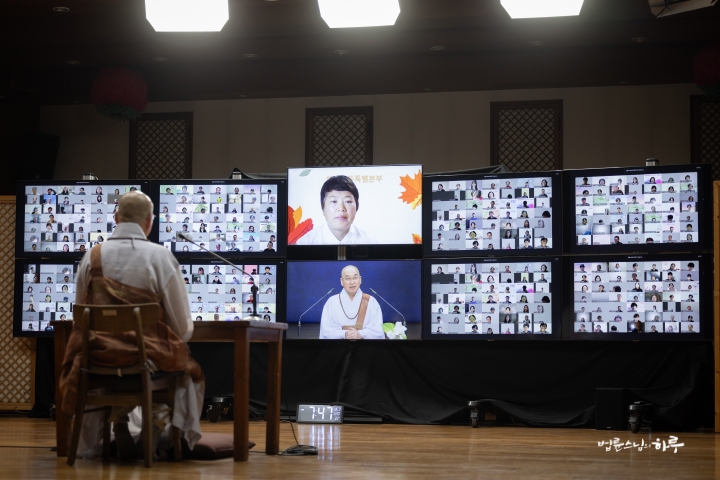
Tomorrow morning, Sunim will have a breakfast meeting with North Korea experts, followed by a meeting with guests visiting the Peace Foundation. In the afternoon, he will meet with social figures outside, and in the evening, he will give a Dharma Q&A lecture at the invitation of the Seoul National University Buddhist Student Association.





